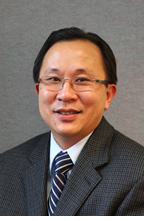 Biological Sciences School Alumnus, Shing Kwok, Ph.D., majored in Biological Sciences in 1989, equipping him for a successful career in both research and government. Dr. Kwok is currently a National Program Leader (NPL) for the National Institute of Food and Agriculture (NIFA) with the U.S. Department of Agriculture (USDA). Dr. Kwok provides leadership and direction for shaping the national research portfolio in agricultural and plant sciences. Through his scientific expertise and program leadership, he administers competitive grant programs in basic plant biology, bioenergy, and biotechnology that fund research that has both national and international agricultural significance.
Biological Sciences School Alumnus, Shing Kwok, Ph.D., majored in Biological Sciences in 1989, equipping him for a successful career in both research and government. Dr. Kwok is currently a National Program Leader (NPL) for the National Institute of Food and Agriculture (NIFA) with the U.S. Department of Agriculture (USDA). Dr. Kwok provides leadership and direction for shaping the national research portfolio in agricultural and plant sciences. Through his scientific expertise and program leadership, he administers competitive grant programs in basic plant biology, bioenergy, and biotechnology that fund research that has both national and international agricultural significance.
Dr. Kwok says of his studies, “My undergraduate training was very diverse. I took core courses that covered genetics, ecology, human physiology, biochemistry, and molecular biology. This diversity clearly helped me in my role as a National Program Leader today.” Dr. Kwok believes this diverse knowledge allowed him to interact with scientists from across the nation, and globally. On the importance of studying biology, Dr. Kwok says, “I think an education in biological science is important because it provides knowledge into how living organisms function, whether that is a human, a mouse, a plant an insect, or a microbe… the degree of understanding how these organisms function at the molecular, physiological, and ecological or population level helps us understand biological diversity, how to improve life, and how to make the world we live in a better place.”
At UCI, Shing Kwok not only an excellent biology student, but also a well-rounded and active member of the UCI community. Dr. Kwok served as a Campus Representative, conducting many tours while walking backwards around campus. Dr. Kwok jokes, “I still remember our motto back then: ‘UCI: moving forwards, walking backwards.” Additionally, Dr. Kwok played the mellophone with the UCI band.
After completing his undergraduate training, Dr. Kwok spent three years working as a Research Associate at Caltech. While at Caltech, he worked on cloning the first hormone receptor gene in the model plant, Arabidopsis thaliana. Subsequent to that, he went on to Yale University School of Medicine, where he received a Masters and Doctorate degree in Genetics. His work at Yale consisted of a thesis that was focused on understanding molecular genetics of light regulation and protein degradation in plants.
